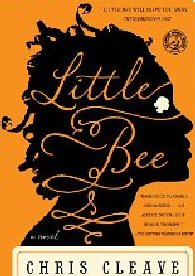One of the finest novels we’ve read in a long time, Chris Cleave’s Little Bee is an unputdownable work of heartrending sadness.
What happens when the paths of two young black sisters, their pursuing bunch of crazed oil rebels and a young White tourist couple from UK collide on a Nigerian beach?
A lot, actually. Enough to fit 266 pages of a paperback!
Set in the idyllic suburbs of London and partly in the antipodean lawless corner of Nigeria, Little Bee is the moving story of our young eponymous Nigerian asylum-seeker in the UK and Sarah, an adulterous middle class woman working as a magazine editor in London.
The book has two narrators, the 16-year-old Black girl Little Bee and the 30-year-old White woman Sarah, each taking turns to talk to us in alternating chapters.
If the brief encounter of Sarah and Little Bee on the edges of an African jungle turns out to be unforgettable, the longer second meeting in the London suburb happens under no less trying circumstances.
Chris Cleave has woven such a fine portrait of both characters that it’s hard to say whose story is the more touching.
Is it Little Bee’s, whose placid life in the village is changed forever after oil is discovered in the area and soon after suffers the loss of her parents and sister Nkiruka (she was the kind of girl that could make a man forget his troubles) at the hands of the cruel oil rebels. The short passage of her sister Nkiruka’s violent end is very painful and haunting, a reminder of the recurring tragedies in parts of the world where violence is often the norm and peace an aberration.
Or is the more touching profile Sarah’s, whose life takes a turn for the worse after the ill-fated Nigerian vacation to save her crumbling marriage only ends up in a bloody disaster on the desolate beach.

Cleave is a fine storyteller, weaving magic with his vivid description of the circumstances of the two women and their surroundings.
Here are a few nice paragraphs from the book to whet your appetite.
The following is the voice of Sarah:
I looked back at Andrew’s coffin and I thought about his face. I thought about it dead. How slowly he had died, over those last two years. How imperceptible it had been, that transition in his facial expression, from deadly serious to seriously dead. Already those two faces were blurring together for me. My husband alive and my husband dead–they now seemed only semidetached, as if under the coffin lid I would find the two of them fused like Siamese twins, eyes agape, looking to infinity in both directions. (P. 95)
Now, hear the voice of Little Bee:
Imagine how tired I would become, telling my story to the girls from back home. This is the real reason why no one tells us Africans anything. It is not because nobody has the time to sit down and explain the first world from first principles. Or maybe you would like to, but you can’t. Your culture has become sophisticated, like a computer, or a drug that you take for a headache. You can use it, but you cannot explain how it works. Certainly not to girls who stack up their firewood against the side of the house. (P.128)
The ending is sad and, to an extent, foreordained.
Of course, we wouldn’t expect any other conclusion in the dark continent.
It’s not in the destiny of Africans to experience happy endings.
If we have any cavils about the book, it’s the too mature voice of the 16-year-old Little Bee and the cheap quality binding that came apart before we could even complete reading this spellbinder (Amazon, it’s all your fault).
Movie Coming
If you schmucks haven’t read the book or worse have no plans to read it, not to worry.
Tom Cruise’s ex, Nicole Kidman is making a movie based on the book. Apparently, she’ll play the role of Sarah.
Let’s see how faithful the movie is to the book.

You must be logged in to post a comment Login